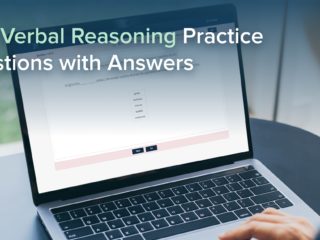| Getting your Trinity Audio player ready... |
For test-takers just starting GRE prep—or wondering whether to take the GRE—it’s tough to separate GRE facts from fiction. If you’ve spent any time looking around online for details about the GRE exam or for advice to guide you in your GRE test preparation, you’ve probably noticed that there is a ton of conflicting information out there. In particular, there are many misconceptions out there about the GRE Verbal Reasoning section. Over the years, many graduate school hopefuls have come to us struggling with GRE Verbal because, as it turned out, they did not have an accurate view of what the Verbal section entails and how to properly prepare for it.
So, in this article, we’ll debunk 7 common GRE myths and misconceptions about how the GRE tests verbal skills and how test-takers should prepare.
Here are the myths we’ll cover:
- Myth #1: Verbal Doesn’t Matter for Math-Based Programs
- Myth #2: You Can Get Partial Credit on Multi-Answer Questions
- Myth #3: Multi-Answer Questions Are Worth More Points
- Myth #4: Questions With Fewer Blanks Are Easier
- Myth #5: You’ll Ace Vocab-Based Questions Just by Memorizing Vocab
- Myth #6: Most of Your Verbal Study Should Be Vocab
- Myth #7: Don’t Bother Studying Critical Reasoning
- Key Takeaways
- What’s Next?
Let’s start with one of the biggest myths out there: that your Verbal score doesn’t matter if you’re applying to programs that emphasize Quant.
Myth #1: Verbal Doesn’t Matter for Math-Based Programs
Fact: GRE Verbal Reasoning still matters, even if it doesn’t matter as much as Quant.
One of the most common questions we hear from students is, does Verbal Reasoning matter for GRE test-takers in math-focused disciplines?
Here’s the thing: many of the GRE myths out there persist because there is a kernel of truth to them. This first myth is a prime example.
It’s true, for example, that Engineering programs pay far more attention to GRE scores in Quant than to Verbal scores. So, all else equal, an outstanding GRE Verbal score wouldn’t make up for a lackluster Quant score. Likewise, your candidacy is unlikely to be tanked by a poor showing in Verbal if you knocked Quant out of the park. (Again, we’re not accounting for other factors, such as GPA, for the moment.)
Still, we can’t conclude that you have license to bomb the Verbal section if you’re applying to a quant-focused program such as Engineering. Let’s look at why.
You Need to Hit a Certain Score Range Overall
If you’re aiming for a certain overall GRE score range to be competitive at your desired programs, underperforming in Verbal could make hitting the needed range significantly more difficult.
Remember, at competitive programs, whether more math-focused or verbal-focused, test scores tend to be relatively impressive all the way around. The GRE is just one more opportunity for you to show off your skills. When you’re up against stiff competition, you need to take every opportunity you get!
Balanced Scores Demonstrate Grad School Readiness
You may need to perform better in one section than in another, but performing well overall on the GRE demonstrates your overall competence as a student. On the other hand, if your GRE score percentiles are wildly unbalanced, admissions may question your ability to handle the rigors of graduate-level work in general. So, while your Quant score may need to be higher than your Verbal score for a math-heavy program, graduate schools still generally prefer to see relatively balanced GRE test results.
And since your Quant score has to be relatively high for math-heavy programs, having relatively balanced scores means test scoring that is around average or higher in the other GRE sections—including the Writing section. Many test-takers also mistakenly assume that math-heavy programs won’t pay any attention to the GRE Analytical Writing section. But, while a low Writing score is unlikely to be a disqualifier in itself, it could give admissions the impression that you didn’t care enough to even try.
When it comes to something as important as grad school, do you want to take that risk?
TTP PRO TIP:
Quant may be the most important GRE section for math-heavy programs, but all of the GRE test content matters!
Myth #2: You Can Get Partial Credit on Multi-Answer Questions
Fact: There is no partial credit on the GRE!
Many students ask us, is there partial credit in the GRE Verbal section? After all, many questions in GRE Verbal Reasoning require more than one answer or could have multiple correct answers. So, we might think that we can get some credit for getting any of the answers to a question correct, even if we don’t get all of them correct or we leave some of them blank.
Unfortunately, the GRE doesn’t make things quite so easy for us. The GRE format is such that if a Verbal question has more than one correct answer, you must select all of the correct answers to get credit for answering the question correctly. If, for example, you select only 1 answer to a Sentence Equivalence question, which always requires 2 answers, even if the answer you select is correct, the question will be marked as incorrect.
Likewise, if you incorrectly fill 1 of 3 blanks in a Text Completion question, even if you filled the other 2 blanks correctly, you won’t get credit for that question.
The same goes for Reading Comprehension questions that ask you to “select all that apply.” If you select, for example, only 1 answer when 2 are correct, even if your selection was right, you’ll get the question wrong. Or if you select 2 answers, but only 1 of them is right, the question is still marked incorrect.
So, you may be wondering, does the GRE give partial credit on any questions? Unfortunately, not. It’s a tough pill to swallow, but you won’t get some credit for correctly answering some of a GRE question.
KEY FACT:
You must select every correct answer in a Verbal question for the question to be marked correct.
Myth #3: Multi-Answer Questions Are Worth More Points
Fact: More answers don’t mean more points.
Although you have to select all of the correct answers to a question in order to add to your GRE score, you don’t get additional points for correctly answering multi-answer questions. For example, you don’t get 1 point per 1-blank Text Completion question and 3 points per 3-blank question.
It’s true that the overall difficulty level of each Verbal section affects your scaled Verbal score, which is given in 1-point increments. However, no single question within a section is “worth more points” than any other question in that section. Additionally, your final score is not derived by awarding you 1 point per correct answer. (Check out this article for a detailed breakdown of the test scoring algorithm.)
KEY FACT:
Essentially, every question within a given Verbal section is worth the same number of points, regardless of how many answers the question requires.
Myth #4: Questions With Fewer Blanks Are Easier
Fact: Fewer blanks don’t mean easier questions.
It’s natural to assume that Verbal questions requiring fewer answers are easier than questions requiring more answers. On the contrary, there are multiple factors that may make a single-answer Verbal question more difficult than a multi-answer one.
For example, there can be some very tricky, single-sentence 1- and 2-blank TC questions and some easier-level, multi-sentence 3-blank questions. It could be that a 1-blank question features more sophisticated vocabulary in the sentence or in the answer choices. It could be that the structure of the sentence in the question stem is more complex in some way or the meaning of the sentence is more nuanced. Perhaps the context clues in the sentence are less obvious. Perhaps the meanings of the answer choices are more similar to each other, so you have to pay very close attention to the logic and details of the sentence in order to distinguish between correct and incorrect choices.
The point is, every GRE Verbal question type spans the difficulty levels, from easy to medium to hard. So, the logic and vocabulary difficulty of, say, a Text Completion question, does not automatically correlate with the number of blanks (or the number of sentences) in the question stem. Nor is every Sentence Equivalence question harder than every 1-blank Text Completion question.
KEY FACT:
Every GRE Verbal question type spans the difficulty levels, from easy to medium to hard.
Myth #5: You’ll Ace Vocab-Based Questions Just by Memorizing Vocab
Fact: Mastering vocab-based questions involves more than just memorizing vocab.
One of the most common and damaging GRE myths that test-takers hear about the Verbal section is that Text Completion and Sentence Equivalence simply test vocab knowledge. According to this myth, there is nothing more to preparing for these questions than memorizing the definitions of as many GRE vocab words as possible.
The reality is that properly preparing for Text Completion and Sentence Equivalence requires more than becoming a human dictionary. Yes, building your vocabulary is a key aspect of mastering these questions. However, GRE test-takers who make the mistake of treating that piece as if it’s the whole puzzle usually find themselves struggling with medium- and hard-level questions.
The other piece of the puzzle is learning to efficiently analyze and interpret the structure, components, and logic of sentences. Mastering those essential skills requires dedicated study and practice in which you learn:
- how sentence structure affects meaning
- how the meanings of words change in different contexts
- how different parts of sentences relate to each other
- the specific tricks vocab-based questions employ and the clues they contain
So, relying on vocab study alone is not a sound strategy for preparing for vocab-based questions in GRE Verbal Reasoning. See for yourself: try your hand at these Text Completion practice questions and these Sentence Equivalence practice questions.
TTP PRO TIP:
If you rely solely on memorizing vocab to prepare for vocab-based questions, you may struggle with medium- and hard-level questions.
Myth #6: Most of Your Verbal Study Should Be Vocab
Fact: The majority of your GRE Verbal study time should not be spent on memorizing vocab.
Understandably, GRE students often get very nervous about the number of vocabulary words they’ll need to learn before test day. Unfortunately, this anxiety often prompts them to spend the vast majority of their Verbal prep time studying vocab rather than learning the concepts, skills, and strategies necessary to efficiently answer Verbal questions. Don’t make this mistake!
There are a couple of key reasons why devoting most of your Verbal prep to memorizing vocab is a mistake. The first we’ve touched on already: mastering GRE Verbal Reasoning involves so much more than just vocab knowledge. (It is called Verbal Reasoning, after all!) So, you need considerable prep time to develop conceptual knowledge, logical reasoning skills, focus, and attention to detail. Additionally, you must learn specific strategies for each Verbal question type.
The second reason is that attempting to learn too many vocabulary words at once is a losing proposition. If we overdo the number of new words we try to memorize each day, we’ll quickly become confused. We’re very likely to mix up definitions and retain relatively little of what we’re studying.
So, first, focusing most of our Verbal study on memorizing vocab likely means we’re not spending nearly enough time building the other types of Verbal knowledge and skill we need for the exam. And second, spending numerous hours every day just memorizing definitions isn’t an effective way to learn vocab!
Thus, while you should study vocab every day, you shouldn’t make vocab study the bulk of your GRE Verbal preparation.
TTP PRO TIP:
Study vocab every day, but don’t make memorizing definitions the bulk of your preparation for the Verbal section.
So, how much vocab study is too much?
How Much Is Too Much?
We know that we don’t want to make studying vocab the majority (or all) of our GRE Verbal prep. However, we also know that studying vocab is an important part of our prep. So, how much daily vocab study should we strive for?
If you complete 2 hours of GRE prep each day, you could reserve about 30 minutes of that daily study time for vocab study. Of course, depending on your study timeline and your current level of vocab proficiency, you may want to incorporate slightly more or less vocab study into your daily routine.
However, if you find yourself spending 40 or 50% of your total GRE test preparation time (Quant and Verbal included) studying vocab, be extra careful that a) you’re not neglecting other aspects of your Verbal study and b) the law of diminishing returns isn’t starting to kick in.
Also, keep in mind that your 30-ish minutes of daily vocab study does not need to be completed all at once. Because learning vocab is a memorization-heavy task, it’s generally best accomplished in small chunks.
For instance, perhaps your commute to and from work or school is 20 minutes each way on public transportation. You could use the morning commute to study new words and the evening commute to quiz yourself on what you learned that morning. Or, your morning commute could be for reviewing what you learned the previous day. Then, you could study new words on your ride home. Either way, you’d be getting in 40 minutes of vocab study each weekday without overloading your brain.
TTP PRO TIP:
Because learning vocab is a memorization-heavy task, it’s best accomplished in small chunks.
Myth #7: Don’t Bother Studying Critical Reasoning
Fact: If you don’t do dedicated Critical Reasoning prep, you’re not fully preparing yourself for GRE Verbal Reasoning.
Test-takers often find Critical Reasoning questions to be some of the trickiest GRE Verbal questions they encounter. The thing is, there are only a few Critical Reasoning questions on any given GRE. These two facts together create a perfect storm for skipping Critical Reasoning study. After all, if there aren’t many CR questions on the test, and CR is tough to master, why bother?
We get it. Studying for the GRE is tough enough already, so any way to make it easier on yourself is welcome. But the fact remains, if you’re not dedicating any time to preparing for CR, you’re not fully preparing for Verbal. Instead, you’re potentially giving away questions that, had you fully prepared, you would answer correctly.
Will missing those questions tank your Verbal score? On their own, probably not. But what if some other Verbal questions unexpectedly give you trouble on test day? Wouldn’t it be better to not give away additional questions in that case?
Moreover, wouldn’t you rather sit for your test having the confidence that you at least have a fair shot—and maybe an excellent one—at answering any question that might come your way?
At the end of the day, skipping Critical Reasoning in your Verbal preparation isn’t much different from skipping, say, Data Interpretation in Quant. You’ll probably see only a few Data Interpretation questions on your GRE. Are you willing to give them away?
TTP PRO TIP:
Devote some GRE Verbal study time specifically to preparing for Critical Reasoning questions.
Key Takeaways
Preparing for the GRE exam can be especially stressful if you don’t have all the facts. So, make sure you get your information from trusted sources. And, as you embark on your Verbal preparation, keep the following key GRE facts in mind:
- Bombing the Verbal section won’t look great even if you’re applying to quant-based programs.
- You can’t get partial credit on multi-answer GRE questions.
- Multi-answer GRE questions are not worth more points than single-answer questions.
- Verbal questions that require more answers are not always more difficult than Verbal questions that require fewer answers.
- Proper Text Completion and Sentence Equivalence preparation involves more than just memorizing vocabulary.
- Studying vocabulary shouldn’t be the overwhelming majority of your GRE Verbal preparation.
- If you don’t do dedicated Critical Reasoning study, you’re not fully preparing yourself for the Verbal section.
What’s Next?
If you’re applying to business school, you may be wondering, is the GRE harder than the GMAT? Find out in this article comparing the two exams.
Also, is the GRE harder than the SAT? This comparison shows you what to expect.
Is getting a 300 on the GRE hard? Learn how many test-takers achieve that score and what makes the GRE challenging here.
Planning to take the GRE soon? Get tips for selecting GRE test dates here and learn about GRE registration here.



